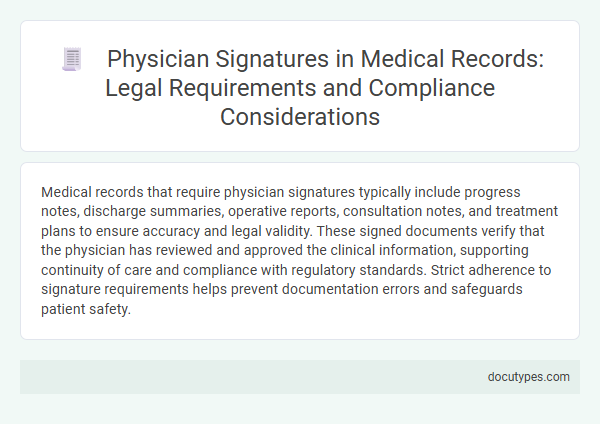Medical records that require physician signatures typically include progress notes, discharge summaries, operative reports, consultation notes, and treatment plans to ensure accuracy and legal validity. These signed documents verify that the physician has reviewed and approved the clinical information, supporting continuity of care and compliance with regulatory standards. Strict adherence to signature requirements helps prevent documentation errors and safeguards patient safety.
Introduction to Physician Signatures in Medical Records
Physician signatures in medical records serve as legal authentication of the information documented during patient care. These signatures confirm the accuracy and completeness of diagnoses, treatments, and clinical decisions. Accurate physician documentation is essential for patient safety, billing, and regulatory compliance.
Legal Foundations for Physician Signatures
Which medical records require physician signatures according to legal standards? Medical records such as operative reports, discharge summaries, and medical histories typically require physician signatures to validate authenticity and accuracy. These signatures serve as legal evidence that the documented care meets professional and regulatory requirements.
Regulatory Standards: Federal and State Requirements
Medical records such as progress notes, operative reports, and discharge summaries typically require physician signatures to ensure accuracy and accountability. Federal regulations like HIPAA mandate proper authentication of medical documentation to maintain legal compliance and patient safety. State laws vary but often align with federal standards, specifying signature requirements to validate medical records and support quality care delivery.
Electronic vs. Handwritten Signatures: Compliance Issues
Physician signatures on medical records are crucial for legal and compliance purposes, especially when differentiating between electronic and handwritten formats. Understanding which documents require these signatures helps ensure your healthcare facility meets regulatory standards.
- Electronic Signatures Must Meet Standards - Electronic signatures on medical records must comply with the Health Insurance Portability and Accountability Act (HIPAA) and the Electronic Signatures in Global and National Commerce Act (ESIGN Act) to be legally valid.
- Handwritten Signatures Provide Tangible Verification - Handwritten signatures are traditionally accepted as direct evidence of physician authorization and may be preferred for certain medical documents to avoid compliance issues.
- Critical Medical Records Require Physician Signatures - Documents such as progress notes, surgical consents, and discharge summaries typically require the physician's signature, whether electronic or handwritten, to validate the record and maintain clinical accuracy.
Authentication and Integrity of Medical Records
Physician signatures are essential for authenticating certain medical records, ensuring their accuracy and legal validity. Proper signature protocols protect the integrity of patient information and support clinical decision-making.
- Progress Notes - These require physician signatures to confirm that the recorded patient assessments and treatments are accurate and verified.
- Discharge Summaries - Signatures authenticate the completeness of the information regarding patient care transitions and future care instructions.
- Operative Reports - Physicians must sign these to validate the details of surgical procedures and outcomes documented.
Your adherence to signing protocols safeguards the credibility of medical records and ensures compliance with healthcare regulations.
Risks and Penalties for Non-Compliance
| Type of Medical Record | Requirement for Physician Signature | Risks of Non-Compliance | Potential Penalties |
|---|---|---|---|
| Operative Reports | Physician signature mandatory to validate surgical procedures and clinical details | Incomplete or unsigned reports can lead to inaccurate patient care and legal disputes | Financial penalties, audit failures, and possible suspension of medical privileges |
| Discharge Summaries | Must be signed by the attending physician to confirm patient status at discharge | Unsigned summaries increase risk of miscommunication in follow-up care | Reimbursement denials, regulatory sanctions, and compromised patient safety |
| Progress Notes | Required for documenting ongoing patient care and treatment decisions | Missing signatures can compromise clinical accuracy and legal defensibility | Negative impact on accreditation and potential malpractice claims |
| Consultation Reports | Physician attestation is essential to validate consultations and recommendations | Failure to obtain signatures may lead to non-compliance with healthcare laws | Legal penalties, loss of trust, and possible exclusion from insurance networks |
| Death Certificates | Strictly requires the attending physician's signature for legal documentation of death | Unsigned certificates can hinder legal processes and family claims | Severe legal consequences including fines and professional disciplinary actions |
Best Practices for Physician Signature Documentation
Physician signatures are mandatory for medical records that include diagnosis, treatment plans, and progress notes to ensure accountability and legal compliance. Proper documentation verifies the accuracy and authenticity of patient care information within electronic health records (EHR) and paper charts.
Best practices for physician signature documentation involve timely signing, ideally within 24 to 48 hours of note creation, to maintain clinical integrity. Utilizing secure digital signature technology enhances security while meeting regulatory standards such as HIPAA and The Joint Commission requirements.
Role of Healthcare Institutions in Ensuring Compliance
Medical records requiring physician signatures include surgical reports, progress notes, discharge summaries, and lab test results. These signatures authenticate the accuracy and completeness of patient information critical for ongoing care.
Healthcare institutions play a vital role in enforcing these regulations by implementing strict documentation policies and regular audits. Your organization must ensure compliance to maintain legal standards and uphold patient safety.
Auditing and Verification Processes
Medical records requiring physician signatures play a crucial role in ensuring accuracy and legal compliance. Proper auditing and verification processes validate the authenticity and completeness of these records.
- Operative Reports - These records require the physician's signature to confirm the details of surgical procedures performed.
- Progress Notes - Physician signatures authenticate ongoing patient assessments and treatment modifications documented during care.
- Discharge Summaries - Signed by the physician to verify that the patient's discharge information is accurate and complete for follow-up care.
Which Medical Records Require Physician Signatures? Infographic

